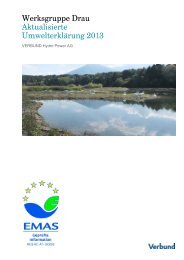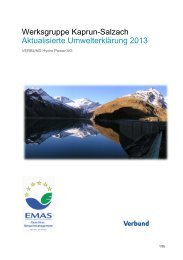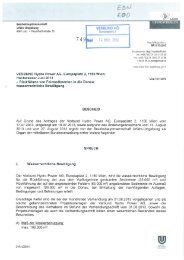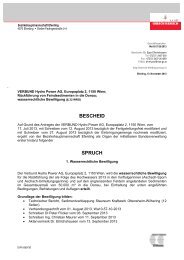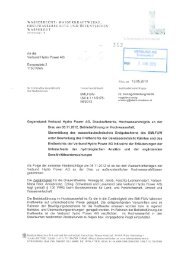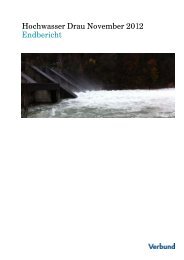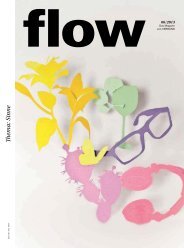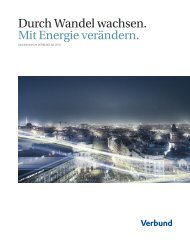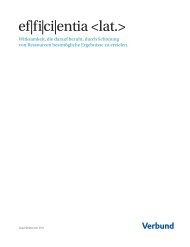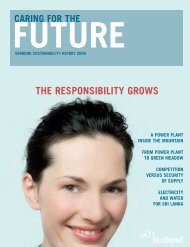Download PDF - Verbund
Download PDF - Verbund
Download PDF - Verbund
Create successful ePaper yourself
Turn your PDF publications into a flip-book with our unique Google optimized e-Paper software.
Austria is already capable of covering a large portion of its electricity needs from renewable energies:<br />
Austria’s hydropower plants delivered 5.3 % more electricity in 2009 due to a good water supply. And<br />
due to the ambitious climate protection goals, it will still be important to attach high priority to the<br />
promotion of renewable energies.<br />
In the Austrian Energy Strategy presented in March 2010, the potential for hydropower expansion<br />
was estimated to be 3.5 TWh by 2015. The doubling of energy generation from wind power, hoped<br />
to be achieved by 2020, places a clear focus on pumped storage power plants to balance out natural<br />
fluctuations in wind energy as necessary.<br />
On the international crude oil markets, the drastic price reduction seen since mid-2008 came to a halt in<br />
the first quarter of 2009. However, oil prices remained a long way from the highs recorded in 2008. Brent<br />
crude oil traded 2009 at an average of $ 63 in 2009; in 2008 it was $ 98 (Brent Front Month).<br />
Based on average prices for 2009, the long-term price of natural gas on the EEX futures market (NCG<br />
front year) was around 41 % lower than in the previous year.<br />
Due to the recession the trading volume on the international market for hard coal for use in power<br />
plants declined significantly compared with 2008. Based on the average price for 2009, the price of coal<br />
on the EEX futures market (ARA front year, euro basis) was around 37 % lower than the average value<br />
for 2008.<br />
European trading in CO2 emission allowances was also hit by the recession. Production shutdowns<br />
at energy-intensive businesses meant that the market was flooded by additional certificates, putting<br />
pressure on prices.<br />
In February, emission allowances (EU Emission Allowances – EUAs) for 2009 briefly traded at less than<br />
€ 10/t. Prices then recovered somewhat, before subsiding once again at the end of 2009 due to the largely<br />
unsuccessful climate summit in Copenhagen in December 2009. Since no binding reduction targets were<br />
agreed, there was no incentive to trade with CO2 certificates. Most recently, a price of just over € 14/t was<br />
reached for the EUA contract for December 2009.<br />
Starting in 2013, the energy companies in western Europe – including <strong>Verbund</strong> – will no longer be<br />
awarded free CO2 certificates. These companies will then have to buy 100 % of their CO2 certificates, as<br />
previously, on the secondary market or at CO2 auctions.<br />
Significant drops in the price of fuel and emission rights were reflected in European wholesale electricity<br />
markets. The average base and peak price for the German/Austrian market region in spot trading on the<br />
Paris-based EPEX electricity exchange in 2009 was substantially lower than in the previous year: the price<br />
for base-load energy was € 38.9/MWh and was therefore about 41 % down on the average value for 2008.<br />
The price for peak-load energy came to € 51.2/MWh, or 42 % down on the 2008 average.<br />
Prices in forward electricity trading also fell. At € 49.2/MWh, the average front-year base price for the<br />
German/Austrian market region on the Leipzig-based EEX electricity exchange in 2009 was down 30 %<br />
on the average figure for 2008.<br />
Meanwhile, the average front-year peak price in 2009 amounted to € 69.8/MWh, also 30 % lower than<br />
the average price for 2008.<br />
BUSINESS FRAMEWORK | SUSTAINABILITY REPORT 2009 | 19<br />
EXPANSION OF PRODUCTION<br />
FROM RENEWABLE ENERGY<br />
SOURCES<br />
PRIMARY ENERGY PRICES<br />
WELL UNDER PREVIOUS<br />
YEAR'S FIGURES<br />
CO 2 EMISSIONS TRADING:<br />
CERTIFICATE PRICES<br />
TEMPORARILY DROP<br />
BELOW 10-1<br />
LOWER PRICES ON THE<br />
EUROPEAN ENERGY<br />
MARKETS



